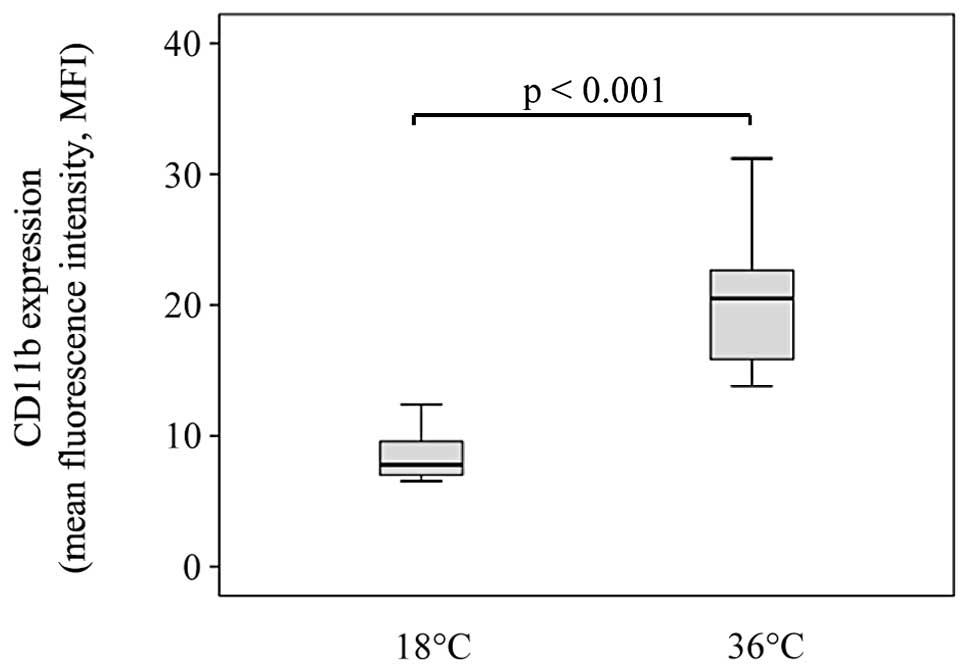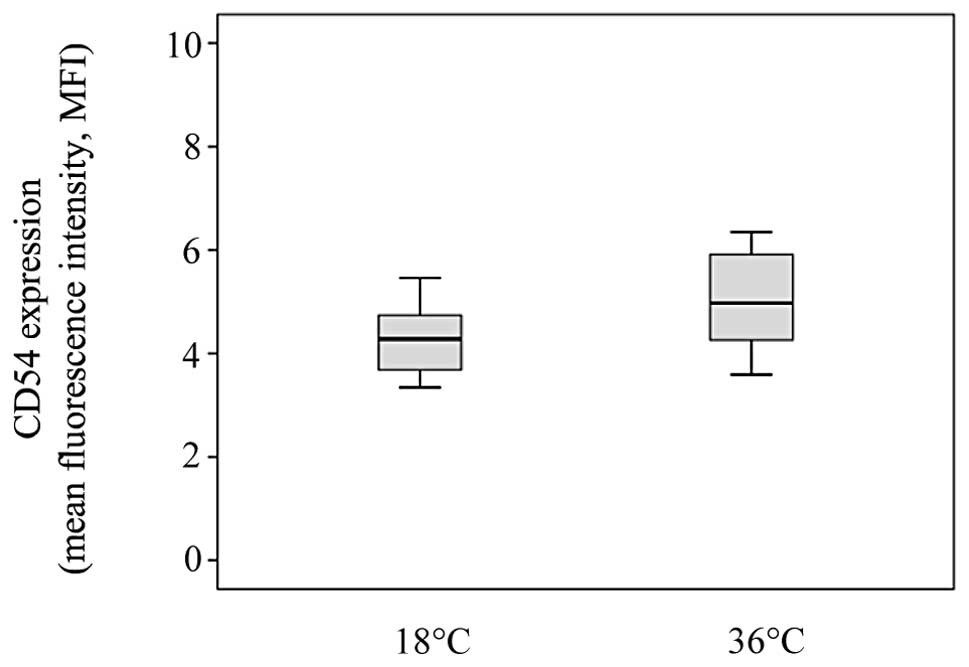|
1
|
Straub A, Azevedo R, Beierlein W, Wendel
HP, Dietz K and Ziemer G: Glycoprotein IIb/IIIa inhibition reduces
prothrombotic events under conditions of deep hypothermic
circulatory arrest. Thromb Haemost. 94:115–122. 2005.PubMed/NCBI
|
|
2
|
Ziganshin BA and Elefteriades JA: Deep
hypothermic circulatory arrest. Ann Cardiothorac Surg. 2:303–315.
2013.
|
|
3
|
Mossad EB, Machado S and Apostolakis J:
Bleeding following deep hypothermia and circulatory arrest in
children. Semin Cardiothorac Vasc Anesth. 11:34–46. 2007.
View Article : Google Scholar : PubMed/NCBI
|
|
4
|
Rimmelé T, Bishop J, Simon P, et al: What
blood temperature for an ex vivo extracorporeal circuit? Artif
Organs. 35:593–601. 2011.PubMed/NCBI
|
|
5
|
Kimura A, Sakurada S, Ohkuni H, Todome Y
and Kurata K: Moderate hypothermia delays proinflammatory cytokine
production of human peripheral blood mononuclear cells. Crit Care
Med. 30:1499–1502. 2002. View Article : Google Scholar : PubMed/NCBI
|
|
6
|
González-Ibarra FP, Varon J and López-Meza
EG: Therapeutic hypothermia: critical review of the molecular
mechanisms of action. Front Neurol. 2:42011.PubMed/NCBI
|
|
7
|
Le Deist F, Menasché P, Kucharski C, Bel
A, Piwnica A and Bloch G: Hypothermia during cardiopulmonary bypass
delays but does not prevent neutrophil-endothelial cell adhesion. A
clinical study. Circulation. 92(9 Suppl): II354–II358.
1995.PubMed/NCBI
|
|
8
|
Lin L, Wu C and Hu K: Tissue plasminogen
activator activates NF-κB through a pathway involving annexin
A2/CD11b and integrin-linked kinase. J Am Soc Nephrol.
23:1329–1338. 2012.
|
|
9
|
Gorgoulis VG, Zacharatos P, Kotsinas A, et
al: p53 activates ICAM-1 (CD54) expression in an
NF-kappaB-independent manner. EMBO J. 22:1567–1578. 2003.
View Article : Google Scholar : PubMed/NCBI
|
|
10
|
Simon DI, Ezratty AM, Francis SA, Rennke H
and Loscalzo J: Fibrin(ogen) is internalized and degraded by
activated human monocytoid cells via Mac-1 (CD11b/CD18): a
nonplasmin fibrinolytic pathway. Blood. 82:2414–2422.
1993.PubMed/NCBI
|
|
11
|
Straub A, Breuer M, Wendel HP, Peter K,
Dietz K and Ziemer G: Critical temperature ranges of
hypothermia-induced platelet activation: possible implications for
cooling patients in cardiac surgery. Thromb Haemost. 97:608–616.
2007.
|
|
12
|
Walter T, Suselbeck T, Borggrefe M,
Swoboda S, Hoffmeister HM and Dempfle CE: Effect of atorvastatin on
cellular adhesion molecules on leukocytes in patients with
normocholesterolemic coronary artery disease. In Vivo. 24:189–193.
2010.PubMed/NCBI
|
|
13
|
Swoboda S, Gruettner J, Lang S, et al:
Hypothermia inhibits expression of CD11b (MAC-1) and CD162 (PSGL-1)
on monocytes during extracorporeal circulation. In Vivo.
27:459–464. 2013.PubMed/NCBI
|
|
14
|
Straub A, Schiebold D, Wendel HP, Azevedo
R, Dietz K and Ziemer G: Platelet anaesthesia during extracorporeal
circulation: differential effects of GP IIb/IIIa blockers on
platelet activation marker P-selectin expression at hypothermia.
Thromb Res. 122:383–389. 2008. View Article : Google Scholar
|
|
15
|
Griepp RB and Di Luozzo G: Hypothermia for
aortic surgery. J Thorac Cardiovasc Surg. 145(3 Suppl): S56–S58.
2013. View Article : Google Scholar : PubMed/NCBI
|
|
16
|
Tassani P, Barankay A, Haas F, et al:
Cardiac surgery with deep hypothermic circulatory arrest produces
less systemic inflammatory response than low-flow cardiopulmonary
bypass in newborns. J Thorac Cardiovasc Surg. 123:648–654. 2002.
View Article : Google Scholar : PubMed/NCBI
|
|
17
|
Mayadas TN and Cullere X: Neutrophil beta2
integrins: moderators of life or death decisions. Trends Immunol.
26:388–395. 2005. View Article : Google Scholar : PubMed/NCBI
|
|
18
|
Cerletti C, Tamburrelli C, Izzi B,
Gianfagna F and de Gaetano G: Platelet-leukocyte interactions in
thrombosis. Thromb Res. 129:263–266. 2012. View Article : Google Scholar
|
|
19
|
Tárnok A, Bocsi J, Rössler H, Schlykow V,
Schneider P and Hambsch J: Low degree of activation of circulating
neutrophils determined by flow cytometry during cardiac surgery
with cardiopulmonary bypass. Cytometry. 46:41–49. 2001.PubMed/NCBI
|
|
20
|
Greilich PE, Brouse CF, Rinder CS, et al:
Effects of epsilon-aminocaproic acid and aprotinin on
leukocyte-platelet adhesion in patients undergoing cardiac surgery.
Anesthesiology. 100:225–233. 2004. View Article : Google Scholar : PubMed/NCBI
|
|
21
|
Asimakopoulos G, Kohn A, Stefanou DC,
Haskard DO, Landis RC and Taylor KM: Leukocyte integrin expression
in patients undergoing cardiopulmonary bypass. Ann Thorac Surg.
69:1192–1197. 2000. View Article : Google Scholar : PubMed/NCBI
|
|
22
|
Roebuck KA and Finnegan A: Regulation of
intercellular adhesion molecule-1 (CD54) gene expression. J Leukoc
Biol. 66:876–888. 1999.PubMed/NCBI
|
|
23
|
Shao B, Yago T, Coghill PA, et al:
Signal-dependent slow leukocyte rolling does not require
cytoskeletal anchorage of P-selectin glycoprotein ligand-1 (PSGL-1)
or integrin αLβ2. J Biol Chem. 287:19585–19598. 2012.
|
|
24
|
Zhang Y, Jiang N, Zarnitsyna VI, Klopocki
AG, McEver RP and Zhu C: P-selectin glycoprotein ligand-1 forms
dimeric interactions with E-selectin but monomeric interactions
with L-selectin on cell surfaces. PLoS One. 8:e572022013.
View Article : Google Scholar : PubMed/NCBI
|
|
25
|
Moore KL: Structure and function of
P-selectin glycoprotein ligand-1. Leuk Lymphoma. 29:1–15. 1998.
View Article : Google Scholar : PubMed/NCBI
|
















